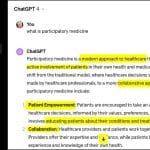In the discussion of patient empowerment, it is worth considering how much care the patient should take on their own shoulders, and when they should turn to their doctor for help. Physicians often do more than would be required if the doctor and the patient was committed to maximum self management. But, on the other hand, it is entirely possible for the patient to do too much, or wait too long, before turning back to the doc for help. So, what’s the answer and where’s the ideal balance between self-care and “doctor visit” care
It seems proper for patients to take responsibility for educating themselves about their condition, carefully consider questions they would like the physician to answer, and commit themselves to an overall fitness plan. The physician should commit to monitoring their condition, obtaining appropriate laboratory and screening tests at the right time, performing periodic examination, filling and refilling medication prescriptions, and providing recommendations and suggestions about modifications to treatment approaches.
But, this is not a clearcut forumula and the best way to strike a proper balance in defiing the right roles for an empowered patient-doctor relationship is to maintain an open attititude, discuss the issues regularly, and be prepared to adjust roles over time. Some of my patients are very well qualified to do their own research, suggest changes in treatment approaches and provide helpful, regular feedback. Others do well just to understand the basics about their condition and their medications.
In the end, the answer to this question is that a relationship should be established, if possible, with your primary care physician in such a way that YOU are the manager of your condition to the extent you are comfortable and able, and the physician is a resource and a facilitator, rather than a manager/controller. Other professionals, including pharmacists, physical therapists, massage therapists, chiropractors, and others will provide care along with the physician. So, you are in the best position to be the overall coordinator of your own care.
A quick review of responsibilities you can assume when you decide to take over your own care management include:
1. Keeping your own health records
2. Researching your medical conditions online
3. Researching your medications and drug-drug interactions online.
4. Interacting online with your physician, if possible.
5. Commiting to maximizing your overall health through weight control, stress management, sleep management, and regular exercise.
6. Providing Regular feedback to your doctor.
7. Using self care tools
So, how far should you go in managing your own health. All the way to the finish line!






Recent Comments